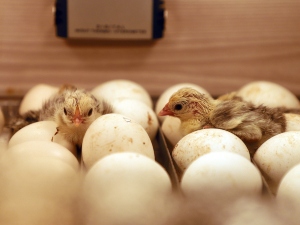
Raising baby chicks can be a nerve-wracking experience, a lot can kill or injure a baby chick.
Knowing this, if you notice that one of your chicks is shaking its head you’d be right to be worried. This article looks into why this happens.
Table of Contents
Baby chick shaking head:
You need to pay close attention to your baby chicks at all times, the slightest change in their behavior and appearance can be a sign that there is something very wrong with the birds.
If your baby chick is shaking its head then this may be why:
Encephalomalacia:
One of the reasons why your baby chick is shaking its head may be because the bird has a disease called encephalomalacia. This disease is also called crazy chick disease.
Crazy chick disease develops in birds who lack vitamin E in their diet. Chicks usually get this disease when they are about 15-30 days old but it can develop in chicks as early as 7 days old, or as old as 56 days old.
The disease not only causes chicks to shake their head, but it also causes the chicks to lose their ability to walk, develop convulsions, develop paralysis, fall on their sides, and even die.
What to do:
Feeding your bird a vitamin E supplement will treat this disease. Feed the bird the vitamin E supplement as well as selenium, selenium helps improve vitamin E absorption.
Sick birds should recover fully if given vitamin E and selenium and as long as the chicks haven’t already sustained permanent neurological damage
Crazy chick disease isn’t contagious but it can affect your other birds too if their diets lack vitamin E.
Keep the other birds from developing this disease by giving the flock nutritionally complete foods and making sure that these foods are appropriate for the bird’s age.
Give the birds free choice feed, birds usually know how much to eat to sustain themselves.
Polyneuritis (star gazing):
Polyneuritis disease is another condition that can cause your bird to shake its head. This condition develops in birds who have a thiamine deficiency.
Polyneuritis not only causes birds to shake their head, but it can also make birds lethargic, lose their appetite, develop convulsions, lose the ability to stand, and cause them to freeze in a looking-up position.
This symptom of looking up and freezing is how the disease got its name.
What to do:
Supplement thiamine into your bird’s diet as soon as you realize that your bird has Polyneuritis. If the bird rejects the oral supplements you can take your bird to the vet to get a thiamine injection.
In addition to giving the bird thiamine supplements, make sure that you feed the bird feed that contains all the vitamins and minerals needed for overall good health.
Your bird will recover from this ailment as long as it gets the proper treatment.
This isn’t contagious but other birds in your flock may develop this condition if their diets also lack thiamine.
Giving your birds access to free-range feed, that contains all the vitamins and minerals that the birds need, will help keep your birds from developing this condition.
Also, make sure that the feed that you serve your birds is appropriate for the bird’s age.
They are listening to you:
Some chickens, chicks included, will shake their heads as they listen to you. One of your birds may shake its head when it listens to you, or, all of your birds may do this simultaneously.
What to do:
Watch how your bird acts when you’re talking to it and then watch how it acts when you aren’t talking to it. If your bird only shakes its head when you’re talking to it then the shaking means that the bird is listening.
Normal behavior/habit:
A chick shaking its head is not unnatural, your bird may randomly shake its head on occasion, but this isn’t an issue as long as it isn’t something that the bird constantly does.
The bird may be shaking its head because it is irritated by something. Chicks don’t have hands so they may shake their heads to get rid of a hair or a bit of grass in their mouths.
What to do:
Keep an eye on the bird and observe it over some time to make sure that no other odd symptoms come up.
Check to see if anything is stuck in your bird’s mouth. Gently hold the bird, without squeezing it, and open the bird’s mouth to look inside. You’ll be able to see if there is anything in the bird’s mouth that could be irritating it.
If you can’t find anything else wrong with the baby bird then you can let the bird be, it will eventually grow out of this habit.
Why is my chicken’s head floppy?
The reasons behind your bird’s floppy head are vast and plentiful.
Reasons why your bird’s head may be floppy include the ingestion of toxins, a vitamin deficiency, or a genetic disorder. The name for a condition where a chicken has a floppy head is wry neck.
What can you do for a sick baby chick?
The best thing you can do for your sick baby chick is get it to the vet, an avian vet preferably.
If you can’t immediately get the bird to the vet you can help the bird at home till you can get the bird to the vet.
Do this by keeping your sick bird hydrated, isolating the bird, which will also keep the rest of the flock safe, encouraging healthy eating, and focusing on rest and healing.
If you enjoyed this article then you may also be interested in other chicken related articles. Here are some articles that you may be interested in: Chicken Shaking Head And Opening Mouth, Home Remedies For Chicken Eye Infection, White Pus In Chicken Eye, Yellow Pus In Chicken Eye, Chicken Shaking Head And Closing Eyes

